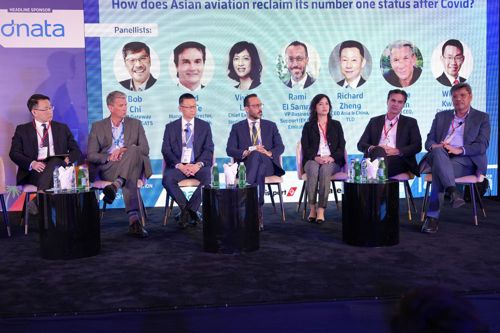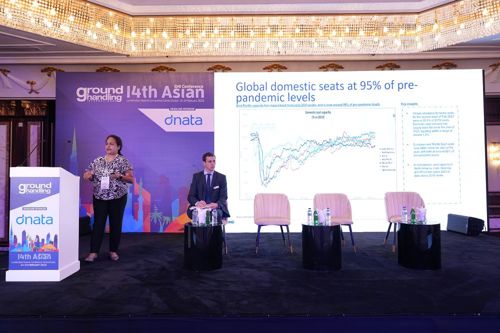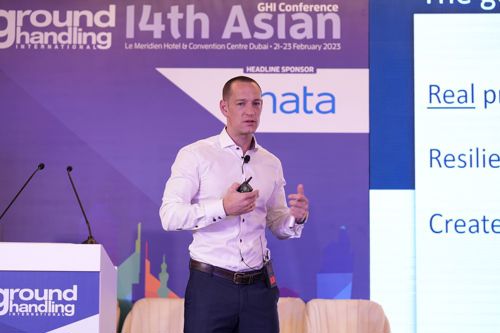
Asia was the first region of the world to be hit by the pandemic and the last one to reopen with China lifting the last of its restrictions.
Opening the show on Tuesday 21 February, Conference Chairman Max Gosney told the audience it had been 1,072 days since GHI was meant to host the 14th Asian Conference and it was great to be back.
The conference had already welcomed an ultra-VIP, His Highness Sheikh Ahmed bin Saeed Al Maktoum, who helped turn Dubai into the aviation hub that it is today and Emirates into a leading airline that many visitors had used to travel to the show.
In his opening speech, Gosney said: “When we were looking to locate this conference back in the dark days of the pandemic, late 2021, we were looking to find a destination that, we as conference organisers and you as delegates could believe in that it was possible to host an event and Dubai was very much open in the Covid period and it stood tall as a venue to facilitate and step up to the challenge of holding this Asian event.”
He wanted to thank dnata, the Emirates Group and the emirate of Dubai for their work in making the show possible. dnata was the headline sponsor so there was a round of applause for the whole team and the CEO, Steve Allen, who was present on the first panel discussion, before thanking all the sponsors for their support.
The conference started by looking at the rebound in demand Asia is experiencing now that restrictions have been lifted. Pre-pandemic, Asia was the fastest growing aviation market and it is working to retake the crown with markets such as Singapore and Hong Kong reopening last year and China opening its doors in January.
Citing a recent report from Avolon, Gosney said: “For every two seats of capacity being added by airlines globally, one is here in the Asian market. Traffic, according to IATA’s latest passenger data, is up over 300% and the Avolon report says that while the US and Europe were the growth leads when reopening in 2021 and 2022, the economies in the Asia-Pacific region look in the best place heading into 2023.”
The whiplash effect was a term from the report describing how rapidly demand rebounded with Gosney highlighting the need to recruit staff, which has always been a challenge, but it needs to be done on the double.
Brad Moore, Managing Director Asia and Australasia at Swissport called 2022 a tale of two halves, starting with opening domestic operations ramping up quickly before international borders opened up, which was in a staged fashion as different countries opened up. Things have accelerated with China opening up resulting in a surge of capacity, particularly to Japan and South Korea and also to Australia and New Zealand.
In Dubai, dnata ramped up early on, said Allen, working with the airport to make sure it was ready for services to resume, which was a success. Elsewhere in dnata’s network, Australia had a disorderly opening, Singapore was very organised and the Philippines was somewhere in between, which Allen said reflects the countries as much as it reflects the ground handling industry.

Recruitment challenges
Aviation was decimated in Australia, said Moore, so trying to employ people when the borders reopened has been challenging due to the industry being viewed as unattractive and unstable combined with unemployment rates being low.
Pre-Covid recruitment methods were not going to work so Swissport had to get creative with methods including using social media, modifying renumeration strategies and using recruitment agencies, which quickly taught Swissport what works and what does not.
Allen said dnata had similar experiences to Swissport, finding onboarding challenging due to disconnection between different airport entities, which resulted in a blame game which does not benefit anyone. Collaboration means companies can be more agile and going forward, the industry needs to accept that it will not retain staff for as long as it used to. The people who worked for over 30 years have left and the new generation want clear career progression.
Training needs to be more automated and digitised because if not, costs will rise every time a new member of staff needs to be trained. Allen called for GSE manufacturers to make standard equipment so new staff do not need to be trained on several different types of equipment and in an industry heavily dependent on manpower, automation is essential saying that if another pandemic came along, it would be twice as difficult to get people back.
He said: “The good news is that aviation is back; when the first countries opened up people were really worried about Omicron, saying, ‘will we shut down again and should I take a job in aviation? I feel uncomfortable committing my career to the industry’. I think that’s all gone, aviation is sexy again, ground handling is even sexier, people are genuinely wanting to get back into aviation.”
Wilson Kwong, CEO of Hong Kong Air Cargo Terminals (Hactl) said it did not lay off any staff but people retired or left. It is also finding attracting staff a challenge with people saying the job is too hard, too far away or they can get a better job paying the same money so the industry needs to ask if it is paying staff the right amount.
Agreeing with the points about talent management and employee retention, Kwong said more than Hactl’s workforce has been with the company for more than 10 years, before adding: “We cannot take that for granted, people stay for three-four years. People are looking for various part-time jobs, some people are looking to be paid on a daily rate and I think people are looking for more and more excitement from their job, not just working in air cargo.”

Recovery
Aviation was ravaged by the pandemic but there is hope on the horizon, Sheila Nazareth, Director – Lead for Aviation Sector Advisory at KPMG told the audience in the session: “Financial Outlook: How quickly can Asia rebound?”.
Growth is happening, she told delegates, the question is how it will happen. Globally, domestic seating is 95% of pre-pandemic levels with some routes exceeding this level. Asia is at pre-pandemic levels helped by governments launching travel programmes, citing schemes in Japan, Vietnam and Laos.
Internationally, global seat capacity is above 90% of pre-pandemic levels and Asia, which was the first hit by the pandemic and last to recover, is now recovering by exceeding 60% of pre-pandemic levels with China and Japan, who both had severe travel restrictions, now lifted.
This year, the global economy is predicted to pass the $100 trillion barrier with aviation contributing 3.5% and providing 88 million jobs, which is more than before the pandemic. In Asia, the aircraft fleet was around 8,000 in 2019 and is expected to grow to over 19,000 by 2040 with deliveries to exceed 17,000 due to a mix of fleet expansion and renewal. Globally, the fleet will double from 26,000 to almost 50,000 aircraft.
Nazareth said: “If you look at history, aviation has doubled every 15 years and I don’t see any reason why that should change.”
Globally, ground handling is a $60 billion market, Nazareth told the audience, of which half is a restricted market due to self-handling being popular in regions such as the Americas.
The market for ground handlers is around $31 billion and growth is expected to average 5.6% from 2022 to 2027 when it will exceed $40 billion. Of the 17,000 expected deliveries, 70% will be narrowbody aircraft, which could lead to an explosion in low-cost travel, increasing demand for outsourcing ground handling.
Asia Pacific is leading the way for airport expansion, with almost no country not modernising existing airports or building new ones. Globally, there are 425 major construction projects valued at $451 billion, of which 40% of the projects are in Asia. Nazareth added that there are 224 new airport projects worldwide with 132 in the Asia-Pacific region.
When international visitor numbers will recover is a question many are asking so Nazareth went to the Pacific Asia Travel Association (PATA) for their suggestions. Presenting three scenarios, the most optimistic projection says it will recover this year followed by 20% annual growth. The middle scenario estimates 2024 and the most severe does not expect recovery before 2025.

Learning from others
One advantage for Asia being the last region of the world to open up is that it can learn from the mistakes of other regions and open up in a more orderly manner.
Jelmer Melissen, Chief Technology Officer of Viggo had experiences to share on the final day in his presentation, “Coming out of the crisis, with the benefit of hindsight”.
Viggo has a multi-skilled model, providing passenger and ramp handling services, cleaning and security services. It uses a lot of technology, with Melissen saying IT and data are the foundations of everything Viggo does.
When the pandemic struck, many predicted that it would take years for aviation to recover and everything would go virtual as people embraced Teams and Zoom. In reality, Airbus A380s have been dusted off and returned to service and people were eager to travel again for business and pleasure.
Based in the Netherlands, Viggo got to see how suddenly travel picked up last summer, going from few people travelling to passengers queuing out of the terminal building and on to the nearby motorway.
Governments in Europe had furlough schemes in place, which meant people did not work for a few months and even experienced staff were out of practice. Melissen advised retraining staff, treating them as if they were new employees again, even if they had been working in aviation for years.
Similarly for GSE, Melissen commented: “Just because you parked it functioning 10 months ago doesn’t mean it will still work today. We did a site test on all of our GSE as if we had bought second-hand kit because there is always something not working.”
You cannot wear people out is another important point Melissen raised. People have different limits, Melissen said one employee worked all 31 days in August, which was not a HR system mistake, he did it and was fine.
Team leaders were empowered to decide if someone needs to go home early because it is cheaper to pay them for the shift, even if they did not complete it, or have a paid day off, rather than let them make a costly error such as damaging an aircraft.
Not relying on percentages and letting people make their own decisions, the results were amazing, said Melissen, with Viggo only having a 10% absence rate compared to one of its airline customers, which had 22%.
Telling the audience that the glamour of aviation has gone, Melissen said: “People don’t want to work at the airport anymore, there is too much stress and the wages are not that great so we tried to give people back something.”
This included anti-aggression training to cope with unhappy customers who had been queuing for four hours and still missed their flight and investments in electrical equipment to make ramp operations cleaner and quieter.
Working at an airport with many stakeholders, Viggo had discussions with other companies to see if anyone needs help or if they know about problems. One competitor was short of staff in one area and Viggo was short in another area so they swapped staff and did not worry about invoicing.
Looking at flight schedules, if airline demands were impossible due to Viggo lacking the staff, it would decide whether to delay a few flights rather than trying to do all of them and delaying them all.
At the APOC meetings, if it was clear security was having issues, not all the bags would be loaded until the gate was closed as a few may need to be unloaded due to passengers not getting through.
Viggo is a fan of using data but it soon found out that its data and modelling was useless when people started turning up six hours before their flights. Having updated the models, Viggo then realised that its variables on passenger behaviour were wrong too. A web scraper was developed to check keywords such as queue and airport, which proved much better at predicting issues.
Highlighting resiliency over efficiency, Melissen quoted Charles Darwin by saying it is not the species who are most efficient who survive but the most resilient because they can change, something companies and organisations must remember.
Celebrating short-term goals is important to keep up morale because if 90% is going well, that should be recognised and the other 10% can be dealt with.
Recommending the book Scrum by Jeff Sutherland, Melissen advised not planning too far ahead because it is hard enough knowing what will happen in one month let alone six months.
And remember, he added: “Keep calm and love aviation.”






